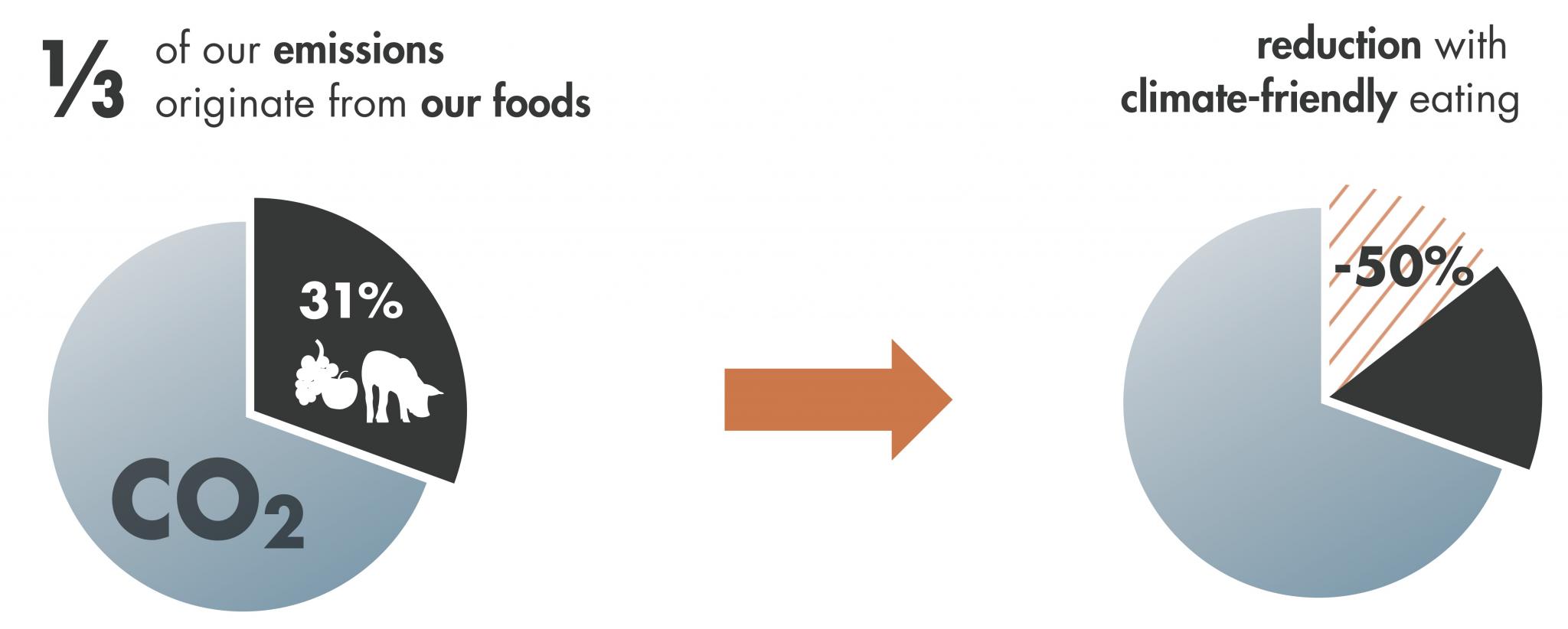Eaternity works with caterers and restaurants to drive climate-friendly eating. Eaternity’s Judith Ellens says chefs can reduce the carbon emissions of a meal by 60% and still serve competitive, tasty and nutritious meals.
Working with Eaternity has really helped open my eyes to some crucial facts that we all need to understand if we want to adopt a fairer and more sustainable diet. For example, did you know we need 2.5 planets to sustain us?
This fact shocked me. If everyone on the planet lived similar lifestyles to what we currently have in the UK, we would need more than 2.5 planets to sustain us. To me this shows, that the question of how to live sustainably is intimately connected to our daily lives. Technology can help us to become more efficient. But it cannot answer a question of fairness: how many resources are you and I entitled to compared with others? In that sense, sustainability concerns me deeply: How do we restore balance in the world and satisfy everyone? How do we achieve sustainable fairness; a world in which resources are used and distributed sustainably and fairly.
A crucial issue to tackle is the way we currently produce and consume food. It is one of the major causes of environmental degradation worldwide. In Europe, our food choices alone are responsible for around 30% of our greenhouse gas (GHG) emissions. Our impact doesn’t stop at national borders. More than 40% of the food consumed in the UK is imported and this trend is rising. Plus the greenhouse gas emissions that we produce locally impact globally.
You and I are part of the solution
The good thing about food is that we have a great variety to choose from. Everyone can decide to make a small contribution every day. Scientific evidence shows that there is nothing more effective than adjusting our weekly diet. And in fact - it is necessary. Eating a meal with a lower GHG-footprint three times a week doesn’t just improve your health, but would easily avoid around 10 million tons of CO2 per year in the UK. Taking 3.7 million cars off the road or planting of 337 million trees would have a similarly significant impact.

I have an appetite for change. Despite this, deciding on a daily basis which meals are most sustainable, is not an easy task. To measure the sustainability of food we need to crunch large amounts of data. There seems to be no simple golden rule. The problem is that current and easier to grasp ideas of sustainable food, such as organic, local and vegetarian food do not always recognise climate change and resource use impacts. While meat dishes are generally higher impact foods, confusingly, a meal with meat can sometimes have a lower carbon footprint than a vegetarian meal, and a meal with local products can have a higher footprint than one with imported vegetables when the full lifecycle of all the ingredients are considered. This can be the case if a meal contains resource intensive foods such as matured cheese, intensively dried fruits or highly processed French fries, or if vegetables (such as tomatoes and bell peppers) have been grown in heated greenhouses and/or air-freighted
To tell the complete sustainability story we need to include the carbon footprint in our calculations. A huge advantage of this is that when we reduce our carbon footprint we also reduce our impact on land, water and the use of toxic chemicals. Widening our perspective gives us more flexibility in how to achieve the goal of living sustainably. Yet the challenge is how to put this into practice.
Turn the restaurant industry into sustainability heroes
Knowing the impact and potential of food, we started Eaternity six and a half years ago in Switzerland to promote climate-friendly foods in society. Despite the simplicity of the idea, knowledge was not widely available nor translated into practical approaches. In 2009 we demonstrated in our first restaurant project that chefs can reduce the carbon emissions of a meal by 60% and still serve competitive, tasty and nutritious meals. With the carbon footprint of meals ranging from a few hundred grams to more than 5.5 kg CO2e, restaurants offer plenty of scope for offering lower carbon choices. Since this first project we have developed a solution, the Eaternity Cloud, that turns chefs and restaurant managers - and in future anybody - into sustainability experts themselves.
With the help of the right tools and technology we can empower an entire industry to become more sustainable. Nowadays we can reduce complex problems into simple solutions. By integrating automated measurements into the daily routines of a restaurant, sustainability can become a factor that can be measured. Seeing the carbon footprint of every meal and all planned purchase allows a chef to make informed decisions. Sustainable efficiency becomes as applicable as cost efficiency. By sharing the information on the environmental impact of meals a restaurant gives their guests a choice too. Customers are now able to make a small contribution to the world without effort. Currently 180 restaurants in Switzerland measure their carbon footprint daily - and are ahead of the game. They know where they stand compared to others, and 43 of those serve climate-friendly meals. All of them are committed to reduce their impact by 20% by 2020.
With this movement we feel we are at the brink of something new. We have gained the ability to learn and set new standards. In the UK some 8 billion out-of-home meals are served every year. Are you ready for an appetite for change? If so, support our movement and let’s talk real business – sustainable business.
Judith Ellens is co-founder and CEO for Eaternity. You can contact Judith via email: judith.ellens(at)eaternity.ch and follow on Twitter: @Eaternity.
To find out more about what inspired Eaternity watch this Tedx video here from co-founder Manuel Klarmann.
